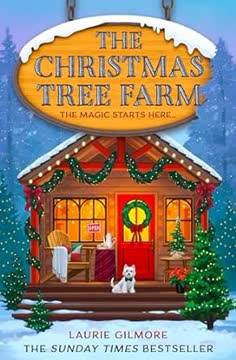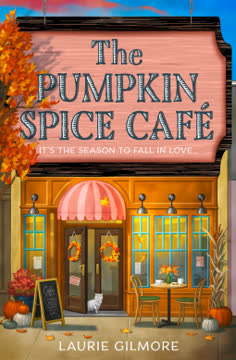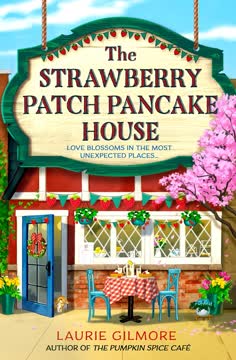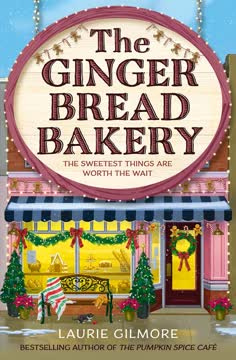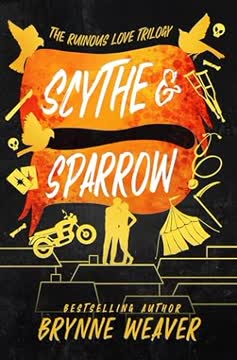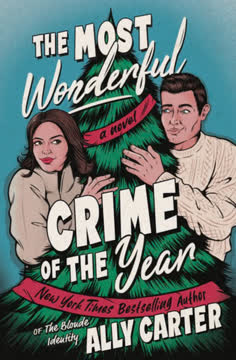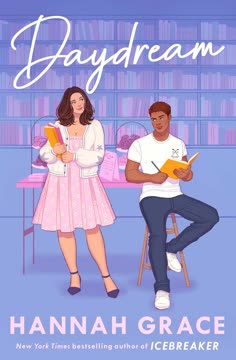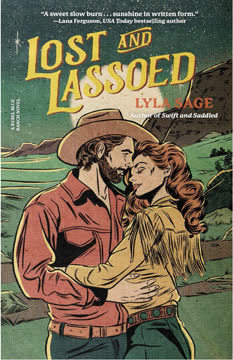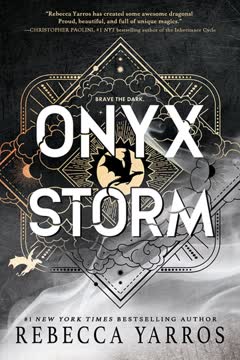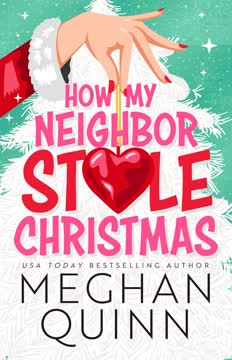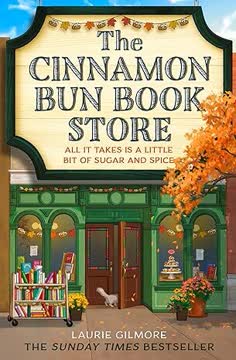Plot Summary
Grumpy Tree Farm Arrival
Kira North, a self-proclaimed Christmas-hater, impulsively buys a run-down Christmas tree farm in the picturesque but nosy town of Dream Harbor. She's alone, freezing, and overwhelmed, having lost her twin sister to marriage and Denmark. The farmhouse is decrepit, the heating barely works, and the locals are relentless in their attempts to welcome her. Kira's plan to avoid reopening the farm crumbles under financial pressure, and she's forced to confront her lack of practical skills and her deep-seated loneliness. Her only solace comes from biting into gingerbread cookies and the fantasy of a self-sufficient, Instagram-worthy life.
The Reluctant Neighbor
Kira's isolation is interrupted by Bennett Ellis, a visiting tech worker and dog owner, whose three dogs barrel onto her property. Their first encounter is prickly—Kira is defensive, wrapped in a blanket, and Bennett is too wholesome for her taste. Despite her resistance, there's a spark: she's charmed by his dogs, and he's intrigued by her vulnerability beneath the sarcasm. Both are running from their own disappointments—Kira from her family and failed plans, Bennett from a string of failed relationships and a need to be needed.
Town of Meddling Hearts
Dream Harbor's quirky residents are obsessed with community, tradition, and a decades-old mystery about a possible body or treasure buried on Kira's land. Bennett is roped into the town's schemes as a "neutral party" to check on Kira and the farm, under the guise of helping her but really to satisfy the town's curiosity. The town meeting is a whirlwind of gossip, matchmaking, and pressure, setting the stage for Bennett and Kira's reluctant partnership.
The Fixer and the Fortress
Kira's farmhouse is falling apart, and Bennett's fixer instincts kick in. He offers to help with the heating, but Kira resists, determined to prove she can do it alone. Their dynamic is a push-pull of pride and vulnerability—Kira doesn't want to be a damsel, and Bennett can't help wanting to fix things. Their banter is laced with attraction, but both are wary of getting close. The house's coldness becomes a metaphor for Kira's emotional walls.
Unwanted Help, Unlikely Friends
When Kira's employees bail on opening day, she's forced to accept help from Bennett and his friends. The town rallies, and Kira is swept into the warmth of community support. She's uncomfortable with the attention and the feeling of indebtedness, but the experience chips away at her isolation. Bennett, meanwhile, is drawn deeper into Kira's orbit, his "fixer" tendencies both a blessing and a curse.
The Christmas Tree Conundrum
Kira's business struggles mirror her internal battles. She's desperate for the farm to succeed, not just for money but to prove she can stand on her own. Bennett continues to help, but their interactions grow more personal—he learns about her family, her impulsive decisions, and her loneliness. Kira, in turn, sees Bennett's own struggles with boundaries and his history of being used by others. Their mutual attraction simmers beneath the surface.
Festival Sparks and Waffles
At the town's Christmas festival, Kira and Bennett's chemistry ignites. A shared moment in the waffle line, a near-kiss, and playful banter around reindeer and Christmas traditions bring them closer. Kira's defenses falter as she realizes she enjoys Bennett's company, and Bennett is captivated by her hidden sweetness. The festival is a turning point, showing both what they're missing and what they could have together.
Reindeer, Revelations, and Rivalries
Kira's grief over her sister's absence surfaces, and Bennett's own romantic failures haunt him. Their conversations grow deeper, touching on family, loss, and the fear of being left behind. The town's meddling continues, with rumors, matchmaking, and the ever-present mystery of the farm's buried secret. Kira's vulnerability is met with Bennett's steady presence, and their emotional intimacy grows.
Opening Day Disasters
The farm's grand reopening is a logistical nightmare—employees don't show, customers need help, and Kira is on the verge of collapse. Bennett and the town step in, turning disaster into a community triumph. Kira is forced to accept that independence doesn't mean doing everything alone. The day ends with a sense of accomplishment and a new appreciation for the people around her.
The Power of Community
Kira begins to find her place in Dream Harbor, joining local events, making friends, and letting go of her need to prove herself through isolation. Bennett's presence is a comfort, but she's still afraid to let him in fully. Both are learning that real strength comes from connection, not self-sufficiency. The town's warmth and eccentricity become a source of healing for Kira.
Snowstorm Sanctuary
A blizzard traps Bennett and Kira together in her farmhouse. With no escape, their emotional walls crumble. They share stories, laughter, and confessions in a makeshift blanket fort by the fire. The storm becomes a crucible, melting their defenses and allowing genuine intimacy to blossom. Their physical relationship ignites, but it's the emotional vulnerability that changes everything.
Blanket Fort Confessions
In the aftermath of the storm, Kira and Bennett confront their feelings. Both are terrified—Kira of losing herself in another person, Bennett of repeating old patterns. They agree to enjoy their time together without promises, but the depth of their connection is undeniable. Letters found in the attic—old love notes between the farm's previous owners—mirror their own journey, underscoring the power of risking love.
Letters, Lies, and Letting Go
As Christmas approaches, Kira's fear of abandonment and Bennett's history with an on-again, off-again ex threaten to unravel their fragile happiness. Both are forced to confront their pasts—Kira's guilt over her privileged upbringing and Bennett's tendency to be used by others. A painful but necessary confrontation leads to a temporary separation, each believing it's for the other's good.
Christmas, Choices, and Consequences
Christmas is bittersweet—Kira is surrounded by new friends but haunted by Bennett's absence. Bennett, back in California, finally breaks free from his toxic past and realizes what he truly wants. Both struggle with the consequences of their choices, questioning whether self-sacrifice is always the right path. The town's support and the lessons of the season push them toward growth.
The Aftermath of Absence
Kira throws herself into building a life in Dream Harbor, making friends, improving the farm, and learning to accept help. Bennett, meanwhile, ends his unhealthy relationship for good and reflects on what real love means. Both realize that independence and vulnerability can coexist, and that true happiness requires risking the heart.
Letters Across the Miles
Inspired by the love letters she found, Kira writes to Bennett, finally expressing her feelings and inviting him back—if he wants to return. Bennett, moved by her words, rushes back to Dream Harbor, bringing his own letters and a promise of forever. Their reunion is joyful, honest, and hard-won, built on mutual respect and a willingness to grow together.
The Return and the Reunion
Bennett and Kira reunite, blending their lives, their dogs, and their dreams. They commit to building a future together in Dream Harbor, embracing the messiness and beauty of real love. The town welcomes them, and Kira finally feels at home—not because she's self-sufficient, but because she's found her people and her person.
Treasure in the Garden
While planting a garden together, Bennett and Kira discover a box of jewelry and a letter from the farm's previous owner, fulfilling the town's long-held legend. The treasure is a symbol of the riches found in community, love, and taking risks. They use it to invest in the farm's future, sealing their partnership and the promise of many more Christmases—and adventures—together.
Characters
Kira North
Kira is a former rich girl running from her past, her family's expectations, and the pain of losing her twin to marriage and distance. She's impulsive, stubborn, and fiercely independent, but beneath her sarcasm is a deep well of loneliness and vulnerability. Her journey is one of learning to accept help, trust others, and believe she's worthy of love. Kira's development is marked by her gradual softening—first toward the town, then toward Bennett, and finally toward herself. Her relationship with Bennett is both a challenge and a healing force, teaching her that true strength lies in connection, not isolation.
Bennett Ellis
Bennett is a kind, capable, and slightly self-effacing tech worker who's always been the "helper" in his relationships—often to his own detriment. Haunted by a history of being used by women who needed him but didn't love him, he's wary of falling into old patterns. His time in Dream Harbor, and especially with Kira, forces him to confront his own needs and boundaries. Bennett's arc is about learning to help without losing himself, to love without being used, and to risk his heart for someone who truly sees him. His steady presence and gentle humor are the perfect foil to Kira's volatility.
Jeanie Ellis
Bennett's sister, Jeanie, is the heart of Dream Harbor's social scene. She's warm, persistent, and a little meddlesome, always looking to connect people and foster community. Her own journey from outsider to beloved local mirrors Kira's, and her unwavering support is crucial in bringing Bennett and Kira together. Jeanie's relationship with her brother is loving but honest—she pushes him to be brave and calls him out when he's hiding.
Iris
Iris is Kira's first real friend in Dream Harbor, a jack-of-all-trades with a sunny disposition and a knack for making people feel welcome. She's unflappable, supportive, and a little quirky, helping Kira navigate both the business and social challenges of small-town life. Iris represents the possibility of starting over and the importance of chosen family.
Chloe
Kira's twin sister, Chloe, is her "other half"—practical, loving, and now physically distant. Chloe's absence is the wound that drives much of Kira's initial pain, but her continued support (even from afar) is a reminder that love can endure change. Chloe's happiness and independence ultimately inspire Kira to seek her own.
Logan
Logan is Jeanie's fiancé and a local farmer, representing the stability and know-how Kira lacks. He's initially reserved but becomes a key supporter, offering practical help and business advice. Logan's presence grounds the story in the realities of rural life and the value of hard-earned wisdom.
Annie
Annie is a force of nature—outspoken, funny, and a little wild. She's part of Jeanie's friend group and provides both levity and a model of unapologetic self-expression. Annie's ongoing rivalry/flirtation with another local adds a subplot of romantic tension and humor.
Hazel and Noah
Hazel and Noah are Jeanie's friends and serve as a contrast to Kira and Bennett's rocky start. Their supportive, playful relationship offers a glimpse of what's possible when two people are truly in sync. They also help Kira see that love can be both fun and enduring.
Nicole
Nicole is Bennett's ex, the embodiment of his old patterns—needing him but never choosing him. Her reappearance forces Bennett to confront his own boundaries and finally break free from a cycle of self-sacrifice. Nicole's role is pivotal in clarifying what Bennett truly wants and deserves.
Dream Harbor Townsfolk
The townspeople—book club members, the mayor, and various eccentrics—are both comic relief and the heart of the story. Their nosiness, warmth, and collective memory create the sense of a living, breathing community. They push Kira and Bennett together, embody the theme of found family, and provide the backdrop for both conflict and healing.
Plot Devices
Forced Proximity and the Snowstorm
The snowstorm is the classic romance device that traps Kira and Bennett together, stripping away their defenses and forcing honest conversation. It's both literal and symbolic—a crucible that melts their emotional ice and accelerates their relationship. The storm's aftermath lingers, shaping their choices and fears.
The Town Mystery and Buried Treasure
The rumor of a body or treasure buried on the farm is both a source of comic intrigue and a metaphor for hidden pain and potential. The search for the treasure parallels Kira and Bennett's search for meaning, belonging, and love. Its eventual discovery is a reward for their growth and a symbol of the riches found in vulnerability.
Letters—Past and Present
The discovery of old love letters in the attic provides a narrative through-line, connecting Kira and Bennett to the farm's history and to each other. The letters inspire Kira to risk her own confession, and Bennett's response—his own letters—cements their bond. The motif underscores the power of words, memory, and the courage to reach out.
Community as Character
Dream Harbor is more than a setting—it's an active force in the story. The town's meddling, traditions, and collective memory shape the plot, challenge the protagonists, and ultimately provide the safety net that allows Kira and Bennett to take risks. The community's warmth is both a source of pressure and a wellspring of healing.
Dual Character Arcs
Both Kira and Bennett must confront their pasts, their patterns, and their fears. The narrative structure alternates between their perspectives, allowing readers to see their internal struggles and the ways they mirror and challenge each other. Their arcs are intertwined—each must learn to accept help, set boundaries, and believe in their own worth.
Analysis
The Christmas Tree Farm is more than a steamy holiday romance—it's a story about the messy, nonlinear process of starting over and the transformative power of connection. Laurie Gilmore uses the familiar tropes of forced proximity, small-town meddling, and opposites attract, but infuses them with emotional honesty and contemporary relevance. Kira's journey from isolation to belonging, and Bennett's from self-sacrifice to self-worth, reflect the challenges many face in a world that prizes independence but often leaves us lonely. The book's humor, warmth, and sensuality are balanced by its exploration of grief, guilt, and the fear of being truly seen. The recurring motif of letters—both historical and present-day—reminds us that vulnerability is an act of hope, and that love, like treasure, is often found when we dare to dig beneath the surface. The ultimate lesson is that home is not a place or a performance, but the people who see us, accept us, and choose us—again and again, through every season.
Last updated:
FAQ
Synopsis & Basic Details
What is The Christmas Tree Farm about?
- A Grumpy Escape: Kira North, a self-proclaimed Christmas-hater and heiress, impulsively buys a dilapidated Christmas tree farm in the quaint town of Dream Harbor, New England, as a desperate attempt to escape her privileged past and the loneliness following her twin sister Chloe's move to Denmark. She arrives unprepared for the harsh winter, the farm's poor condition, and the relentlessly welcoming, yet nosy, townsfolk.
- Unexpected Encounters: Her isolation is quickly challenged by Bennett Ellis, a visiting tech worker and dog owner, whose wholesome demeanor and "fixer" tendencies clash with Kira's prickly independence. Their initial, awkward interactions, often involving Bennett's three dogs, slowly chip away at Kira's defenses, revealing a vulnerability she struggles to hide.
- Finding Home and Self: The story follows Kira's reluctant journey to reopen the farm, navigate small-town life, and confront her deep-seated issues of self-worth and independence. As she grapples with financial struggles, a mysterious town legend about buried treasure, and her burgeoning feelings for Bennett, Kira begins to discover that true strength might lie not in doing everything alone, but in accepting help and finding connection.
Why should I read The Christmas Tree Farm?
- Steamy Holiday Romance: For readers seeking a Christmas romance that delivers more than just chaste kisses, Laurie Gilmore explicitly aims to provide a "steamier" experience, blending cozy holiday charm with undeniable chemistry and passionate encounters. The author's note even states, "For anyone who ever wished Hallmark Christmas movies were steamier, this one might do the trick."
- Deep Character Growth: Beyond the romance, the novel offers a compelling journey of self-discovery for both protagonists. Kira's transformation from a spoiled, isolated heiress to a community-minded, self-reliant woman, and Bennett's evolution from a people-pleasing "fixer" to someone who sets healthy boundaries, provides a rich and satisfying emotional arc.
- Charming Small-Town Setting: Dream Harbor is a character in itself, with its quirky residents, strong community spirit, and festive traditions. The picturesque Christmas tree farm, adorned with twinkle lights and filled with the scent of pine, creates an immersive and heartwarming backdrop that enhances the themes of belonging and new beginnings.
What is the background of The Christmas Tree Farm?
- Dream Harbor's Quirky Culture: The town of Dream Harbor is characterized by its strong sense of community, love for holiday traditions (like the annual Tree Lighting and town meetings), and a collective curiosity about local affairs. Residents like Deputy Mayor Mindy Walsh and the book club members actively engage in town life, often meddling in new residents' lives, which initially overwhelms Kira.
- The Farm's Mysterious History: The Christmas tree farm itself carries a local legend surrounding its previous owner, Edwin. After his wife Ellen's death, Edwin became eccentric, and a cryptic letter found after his own passing hinted at something "important, something precious" buried on the farm. This mystery fuels the town's curiosity and becomes a subtle backdrop to Kira and Bennett's story, as mentioned by Alex: "the legend is left unfinished."
- Kira's Privileged Past: Kira comes from a wealthy Southern family, where her life was "coddled or bailed out of every situation." Her decision to buy the farm "sight unseen" and her initial lack of practical skills stem from this background, highlighting her journey to shed her "spoiled" identity and build something truly her own, independent of her family's influence.
What are the most memorable quotes in The Christmas Tree Farm?
- "I'm trying really hard not to ask you to stay, Bennett. I really am. But you are not making it easy. The fucking universe is not making it easy." (Kira, Chapter 25): This quote encapsulates Kira's internal conflict and vulnerability at a pivotal moment. It reveals her deep emotional struggle between her desire for independence and her growing love for Bennett, highlighting the immense effort she puts into what she believes is the "right" decision, even if it breaks her heart.
- "You are not a bad habit. You are something entirely new. Say the word and I will back here in a fucking heartbeat." (Bennett, Chapter 25): This powerful declaration from Bennett is a direct challenge to Kira's self-perception and his own past patterns. It signifies his complete break from his "fixer" identity and his toxic relationship with Nicole, emphasizing that his love for Kira is genuine and unconditional, free from the baggage of his past.
- "Good people are hard to find, so if you have one be sure not to let them go. Don't screw it up." (~Edwin, Epilogue): This posthumous advice from the farm's previous owner, found with the treasure, serves as a poignant thematic summary. It not only resolves the town's mystery but also acts as a direct message to Bennett and Kira, validating their hard-won relationship and underscoring the novel's core message about the value of genuine connection and the courage to hold onto love.
What writing style, narrative choices, and literary techniques does Laurie Gilmore use?
- Dual Character Arcs & Internal Monologue: Gilmore employs a dual point-of-view, alternating between Kira and Bennett's perspectives, which allows readers deep insight into their individual psychological struggles and unspoken motivations. This technique, combined with extensive internal monologue, reveals their insecurities, desires, and the often-contradictory thoughts that drive their actions, such as Kira's "I hated Christmas. Which was unfortunate considering I was currently the proud owner of a Christmas-tree farm."
- Humor and Banter as Defense Mechanisms: The dialogue is sharp, witty, and often laced with sarcasm, particularly from Kira. This serves as a defense mechanism for her, but also as a key element of the "opposites attract" dynamic with Bennett. Their playful banter, like Kira's "You're wearing a blanket" retort to Bennett's vest comment, not only provides comic relief but also subtly reveals their growing comfort and attraction.
- Sensory-Rich Setting and Symbolism: The author uses vivid sensory details to bring Dream Harbor and the Christmas tree farm to life, from the "nutmeg and cinnamon" of gingerbread cookies to the "cozy lights" of the festival. The coldness of Kira's house symbolizes her emotional isolation, while the eventual warmth of the fire and the "twinkling" Christmas tree represent her thawing heart and the comfort of connection.
Hidden Details & Subtle Connections
What are some minor details that add significant meaning?
- Kira's Santa Cookie: In Chapter 1, Kira bites the head off a Santa-shaped gingerbread cookie, thinking, "Unfortunately, he was absolutely delicious, all nutmeg and cinnamon. Damn him." This seemingly small act immediately establishes her "Grinchy" disdain for Christmas, but the cookie's deliciousness subtly foreshadows her eventual softening towards the holiday and the unexpected sweetness she finds in Dream Harbor.
- The Radiator's "Defeated Whine": Early in Chapter 1, Kira notes, "The ancient radiator beside the door let out a defeated whine." This anthropomorphic detail not only highlights the house's decrepit state but also mirrors Kira's own initial feelings of defeat and overwhelm, setting a parallel between her internal state and her physical surroundings.
- Romance Trope Candles: In Chapter 17, Bennett reads the labels of Kira's candles: "Meet Cute," "Morally Grey," "Enemies to Lovers," "Grumpy-slash-Sunshine," and "Slow Burn." These are all popular romance tropes, subtly winking at the reader about the genre and, more importantly, playfully mirroring Kira and Bennett's own evolving relationship arc, with "Grumpy-slash-Sunshine" being particularly apt for them.
What are some subtle foreshadowing and callbacks?
- Bennett's "Splinter" Thought: In Chapter 2, after his first encounter with Kira, Bennett thinks of her as "Like a splinter. A splinter he couldn't seem to stop picking at." This foreshadows his persistent, almost obsessive, draw to her, despite her initial hostility, indicating that she will get under his skin in a significant, lasting way.
- The Town's "Neutral Party" Scheme: The town's insistence on Bennett being a "neutral party" to check on Kira (Chapter 3) subtly highlights their collective desire for connection and their well-meaning, if intrusive, nature. It foreshadows how Bennett, despite his initial reluctance, becomes deeply embedded in Kira's life and the town's fabric, ultimately leading to his permanent stay.
- Kira's "Reckless Decisions" Pattern: Kira frequently references her past "questionable choices" and "reckless plans," such as buying a racehorse or bringing a "guy with neck tattoos" to a party (Chapter 8). This recurring self-assessment foreshadows her fear that falling for Bennett is just another one of her bad decisions, creating internal conflict that she must overcome to accept genuine love.
What are some unexpected character connections?
- Iris's Unpredictable Nature: While Iris is presented as a sunny, adaptable optimist, Kira notes her "habit of job-hopping" and teases her about being "pretty unpredictable" (Chapter 8). This subtly connects Iris to Kira's own impulsive and unconventional nature, suggesting that despite their different outward expressions, they share a core adventurous spirit, making their friendship more profound than a simple mentor-mentee dynamic.
- Logan's Agricultural Expertise: Logan, Jeanie's gruff farmer fiancé, initially seems like a straightforward character. However, his offer to connect Kira with his "agricultural engineer" (Chapter 9) reveals a deeper, practical support system within the Dream Harbor community. This connection is crucial for Kira's farm to transition from a seasonal business to a year-round garden center, highlighting the town's practical, long-term investment in her success.
- The Book Club's Collective Consciousness: The book club, initially a source of town gossip and comedic relief (e.g., debating if Die Hard is a Christmas movie in Chapter 2), evolves into a collective force for good. Their "field trip" to the farm (Chapter 14) and their "honor system" payment for trees, despite Kira being closed, demonstrates their underlying support and belief in her, acting as a subtle, benevolent "chorus" that guides the narrative.
Who are the most significant supporting characters?
- Iris, the Unflappable Catalyst: Beyond being Kira's first friend and employee, Iris acts as a crucial catalyst for Kira's integration into Dream Harbor. Her unwavering optimism and willingness to "do pretty much anything" (Chapter 8) provide a stark contrast to Kira's initial cynicism, subtly encouraging Kira to embrace new experiences like the wreath-making class and the yoga class, which are vital for her personal growth and community connection.
- Logan, the Grounded Mentor: Logan, Jeanie's fiancé, is more than just a love interest for Jeanie; he serves as a practical, grounded mentor for Kira. His experience running a successful farm allows him to offer invaluable business advice and resources, such as the agricultural engineer (Chapter 9), which directly contributes to Kira's ability to make the farm a viable, year-round business. He represents the practical, stable side of Dream Harbor that Kira desperately needs.
- The Dream Harbor Book Club, the Benevolent Meddlers: While often a source of comedic gossip, the book club members (Jacob, Nancy, Linda, Kaori, Darius) collectively represent the town's well-meaning, if intrusive, community spirit. Their initial "mission" to have Bennett check on Kira (Chapter 3) and their later "honor system" tree purchase (Chapter 14) demonstrate their underlying care and desire for Kira to succeed, subtly pushing her towards acceptance and belonging.
Psychological, Emotional, & Relational Analysis
What are some unspoken motivations of the characters?
- Kira's Self-Punishment: Kira's initial hostility and insistence on doing everything alone, despite her obvious lack of skills, stems from an unspoken desire for self-punishment. She feels immense guilt over her privileged past and her "shitty" behavior, believing she doesn't deserve help or happiness. Her declaration, "I made some really dumb decisions to get here. Let's not romanticize it" (Chapter 17), reveals her deep-seated need to atone for her past, even if it means struggling unnecessarily.
- Bennett's Fear of Irrelevance: Bennett's "fixer" complex is driven by an unspoken fear of being irrelevant or unneeded. His history with Nicole, where he was "used" for his helpfulness, highlights his struggle to find a relationship where he is valued for who he is, not just what he can do. His internal debate about helping Kira, "If he couldn't fix anything for her, then what did he have to offer?" (Chapter 11), reveals this core insecurity.
- Chloe's Guilt and Overcompensation: Chloe's "overcompensating" use of emojis and her persistent worry about Kira, despite her own happiness in Denmark, suggests an unspoken guilt about leaving her twin. She knows Kira relied heavily on her and fears Kira's inability to cope alone. Her offer to invest in Kira's business (Chapter 26) is not just support, but also a way to alleviate her own anxiety about Kira's well-being.
What psychological complexities do the characters exhibit?
- Kira's "Grinchy Heart" vs. Hidden Sweetness: Kira presents as a "Grinchy" Christmas-hater, but her deep affection for animals (Bennett's dogs, the reindeer) and her emotional vulnerability when discussing her sister reveal a profound, hidden sweetness. This duality is a core psychological complexity, as she actively fights against her softer side, believing it makes her weak or susceptible to hurt, as seen when Bennett observes, "every time you talk to an animal, you give yourself away. You show how sweet you actually are" (Chapter 6).
- Bennett's "Damsel-in-Distress Kink" and Boundary Issues: Bennett openly admits to a "damsel-in-distress kink" (Chapter 11), a psychological pattern where he's drawn to women who need his help, often leading to him being taken advantage of. His struggle to set boundaries, particularly with Nicole, is a significant complexity. His internal battle to "stay away from Kira North" (Chapter 11) is a direct attempt to break this cycle, even as his genuine care for her makes it incredibly difficult.
- The Town's Collective Anxiety and Curiosity: Dream Harbor exhibits a collective psychological complexity, driven by a blend of genuine care and intense curiosity. Their obsession with the "buried treasure" and their constant "checking on" Kira (Chapter 3) stems from a desire to protect their community and its history, but also from a need for entertainment and connection in a small town. This collective "nosiness" is both endearing and overwhelming for Kira.
What are the major emotional turning points?
- Kira's Acceptance of Community Help: The farm's disastrous opening day (Chapter 10), where Kira's employees bail and the town rallies to help, is a major emotional turning point. Kira is forced to confront her pride and accept that "being independent doesn't mean you don't need help." This moment begins to thaw her isolation, making her realize the warmth and support of the Dream Harbor community.
- Bennett's Break from Nicole: Bennett's definitive confrontation with Nicole on New Year's Eve (Chapter 27) is a crucial emotional turning point for him. By finally articulating his feelings and refusing to be her "standby" or "human security blanket," he breaks a five-year-old toxic pattern. This act of self-worth frees him emotionally to fully pursue a genuine relationship with Kira, as he states, "I just don't want to be your standby anymore."
- Kira's Letter of Vulnerability: Kira's decision to write a heartfelt letter to Bennett (Chapter 28), confessing her love and asking him to return, marks her ultimate emotional breakthrough. This act of profound vulnerability, inspired by Edwin's old love letters, signifies her acceptance of her feelings and her willingness to risk heartbreak for true connection, moving beyond her fear of abandonment and self-sabotage.
How do relationship dynamics evolve?
- From Hostility to Mutual Respect: Kira and Bennett's relationship begins with Kira's overt hostility and Bennett's persistent, if sometimes exasperated, helpfulness. Their dynamic gradually evolves through playful banter and shared vulnerabilities, moving from "I didn't like this guy and his teasing smile" (Chapter 1) to a deep mutual respect and understanding, where they challenge each other's flaws while appreciating their strengths.
- Challenging "Fixer" and "Damsel" Roles: Bennett's "fixer" tendencies and Kira's initial "damsel in distress" situation (though she vehemently denies it) are central to their early dynamic. Their relationship evolves as Bennett learns to offer help without expecting anything in return, and Kira learns to accept help without feeling indebted or losing her independence. This is evident when Kira tells him, "Accepting help is different than letting other people do everything for you" (Chapter 3).
- From Temporary Fling to Lasting Commitment: What starts as a "holiday hookup" or "Christmas fling" (Chapter 13) born out of loneliness and convenience, deepens into a profound love. The snowstorm forces intimacy, and their subsequent separation highlights their undeniable connection. Their eventual reunion, sealed by Kira's letter and Bennett's return, transforms their relationship into a committed partnership, built on honesty, vulnerability, and a shared future.
Interpretation & Debate
Which parts of the story remain ambiguous or open-ended?
- The Full Extent of Edwin's Eccentricity: While the town describes Edwin, the former farm owner, as "eccentric and unpredictable" (Chapter 3) and even "scary," the narrative doesn't fully delve into the specifics of his behavior or the "rumors" that made people wary. This leaves the reader to wonder about the true nature of his character and the full story behind his reclusiveness after his wife's death.
- Kira's Unspecified "Bad Decisions": Kira frequently alludes to a past filled with "questionable choices" and "reckless plans" (Chapter 8), such as buying a racehorse or bringing a "guy with neck tattoos" to a party. However, the story only provides glimpses, leaving the full scope of her past self-sabotage and the depth of her "shitty human" behavior open to the reader's imagination and interpretation.
- The Long-Term Impact of the Treasure: While the discovery of Edwin's treasure (jewelry) provides a satisfying resolution to the town mystery and financial boost for the farm, the long-term impact of this sudden wealth on Kira and Bennett's lives is left open-ended. The story concludes with their plans to "fix up the barn" and host events, but the challenges and changes that come with unexpected fortune are only hinted at.
What are some debatable, controversial scenes or moments in The Christmas Tree Farm?
- Kira's Initial Hostility and "Manipulation": Kira's initial interactions are marked by extreme rudeness and a deliberate attempt to push people away, even when they offer genuine help. Her internal justification for this behavior, stemming from her past privilege and fear of vulnerability, can be debated. Some readers might find her initial "bitchy recluse" persona (Chapter 6) off-putting, questioning if her transformation is fully earned or if her early actions were truly "manipulative" in her quest for independence.
- Bennett's "Damsel-in-Distress Kink": Bennett's self-diagnosis of a "damsel-in-distress kink" (Chapter 11) and his history of being "used" by women raises questions about his agency and the ethics of his relationships. While the narrative frames his eventual break from Nicole as growth, his initial attraction to Kira, who clearly needs help, could be seen as problematic by some, sparking debate on whether he truly overcomes this pattern or simply finds a healthier outlet for it.
- The Town's Meddling and Lack of Boundaries: Dream Harbor's residents, particularly Jeanie and the book club, actively meddle in Kira and Bennett's lives, pushing them together and discussing their personal affairs. While presented as well-meaning, this lack of boundaries could be seen as intrusive or even disrespectful. The debate lies in whether this "community as character" is charmingly supportive or uncomfortably invasive, and if Kira's eventual acceptance of it is genuine or a capitulation.
The Christmas Tree Farm Ending Explained: How It Ends & What It Means
- The Treasure's Symbolic Meaning: The discovery of Edwin's buried jewelry in the Epilogue, along with his letter advising, "Good people are hard to find, so if you have one be sure not to let them go. Don'
Review Summary
The Christmas Tree Farm receives mixed reviews, with an average rating of 3.66 out of 5. Some readers find it a cozy, festive romance perfect for the holiday season, praising its small-town charm and likable characters. Others criticize the rushed romance, lack of character depth, and predictable plot. Many compare it to a Hallmark movie with added spice. The book features a grumpy-sunshine dynamic between Kira and Bennett, set in the fictional town of Dream Harbor. While some enjoy the Christmas atmosphere, others find the story formulaic and lacking substance.
Dream Harbor Series
Similar Books
Download PDF
Download EPUB
.epub digital book format is ideal for reading ebooks on phones, tablets, and e-readers.
